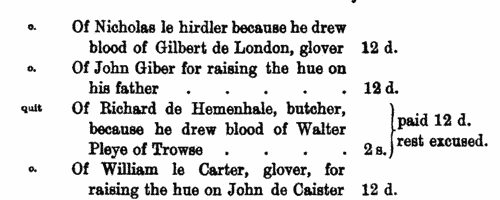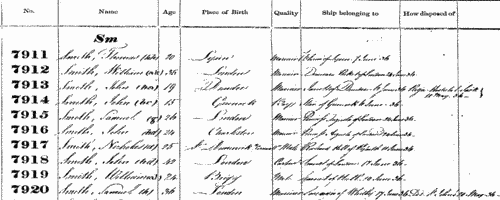Carl Surname Ancestry ResultsOur indexes 1000-1999 include entries for the spelling 'carl'. In the period you have requested, we have the following 18 records (displaying 1 to 10): Buy all | | | Get all 18 records to view, to save and print for £98.00 |
These sample scans are from the original record. You will get scans of the full pages or articles where the surname you searched for has been found. Your web browser may prevent the sample windows from opening; in this case please change your browser settings to allow pop-up windows from this site. Inhabitants of Norwich
(1288-1391)
Among the documents preserved in the record room of the Guildhall in the city of Norwich were 13 rolls connected with the leet courts in the city during the 13th and 14th centuries while the frankpledge system on which they were based was still in full operation. William Hudson, vicar of St Peter Permountergate in the city, prepared a copy of the earliest of these, from 1288, and extracts from the leet rolls of 1289, 1290, 1291, 1293, 1296, 1300, c1307, 1313, 1375 and 1391, and from an account of amercements in 1364, a tithing roll of Mancroft leet of 1311, and inquisitions before the bailiffs in 1350, and these were published by the Selden Society in 1892, with an English translation facing the extended Latin text. In 1288 there were four leets in the city - Conesford (North Conesford, South Conesford and Berstrete subleets), Manecroft (St Stephen, St Peter de Manecroft), Wymer or Westwyk (St Giles, St Gregory, St Andrew and St George), and Over the Water (St Michael and St Clement. Each leet had separate courts and separate records within the rolls. Hudson lists the main categories of items recorded as: murder, violent death, nuisances, weights, unwholesome food, larceny, assaults, hue and cry, being out of tithing, non-attendance at leet, purprestures, forestalling, unlawful trading, craft gilds, fraudulent work, and impleading in the Court Christian. CARL. Cost: £4.00.  | Sample scan, click to enlarge

| Official Papers
(1691-1692)
The State Papers Domestic cover all manner of business relating to Britain, Ireland and the colonies, conducted in the office of the Secretary of State as well as other miscellaneous records. Includes lists of passes to travel abroad.
CARL. Cost: £4.00.  | Sample scan, click to enlarge

|  Masters of apprentices registered in Northampton
(1768) Masters of apprentices registered in Northampton
(1768)
Apprenticeship indentures and clerks' articles were subject to a 6d or 12d per pound stamp duty: the registers of the payments usually give the master's trade, address, and occupation, and the apprentice's name, as well as details of the date and length of the apprenticeship. There are central registers for collections of the stamp duty in London, as well as returns from collectors in the provinces. These collectors generally received duty just from their own county, but sometimes from further afield. The indentures themselves can date from a year or two earlier than this return. (The sample entry shown on this scan is taken from a Salop return. Each entry has two scans, the other being the facing page with the details of the indenture, length of service, and payment of duty.) IR 1/56CARL. Cost: £8.00.  | Sample scan, click to enlarge

|  British merchant seamen
(1835-1836) British merchant seamen
(1835-1836)
At this period, the foreign trade of ships plying to and from the British isles involved about 150,000 men on 15,000 ships; and the coasting trade about a quarter as many more. A large proportion of the seamen on these ships were British subjects, and so liable to be pressed for service in the Royal Navy; but there was no general register by which to identify them, so in 1835 parliament passed a Merchant Seamen's Registration Bill. Under this act this large register of British seamen was compiled, based on ships' crew lists gathered in British and Irish ports, and passed up to the registry in London. Each seaman was assigned a number, and the names were arranged in the register by first two letters of the surname (our sample scan shows one of the pages for 'Sm'); in addition, an attempt was made to separate out namesakes by giving the first instance of a name (a), the second (b), and so on. But no effective method was devised to prevent the same man being registered twice as he appeared in a second crew list; moreover, the original crew lists were clearly difficult for the registry clerks to copy, and some of the surname spellings appear to be corrupted. A parliamentary committee decided that the system devised did not answer the original problem, and this register was abandoned after less than two years: but it is an apparently comprehensive source for British merchant seamen in 1835 to 1836. The register records the number assigned to each man; his name; age; birthplace; quality (master, captain, mate, 2nd mate, mariner, seaman, fisherman, cook, carpenter, boy &c.); and the name and home port of his ship, with the date of the crew list (usually at the end of a voyage). Most of the men recorded were born in the British Isles, but not all (for instance, Charleston and Stockholm appear in the sample scan). The final column 'How disposed of' is rarely used, and indicates those instances where a man died, was discharged, or deserted his ship during the voyage.CARL. Cost: £8.00.  | Sample scan, click to enlarge

| Great North of England Railway Shareholders
(1837)
The return of the railway subscription contracts deposited in the Private Bill Office lists the shareholders in the Great North of England Railway, subscribers towards the £450,995 estimated expense of the project. The list gives witness's name, full name of each subscriber, residence, profession, and sum subscribed.CARL. Cost: £4.00.  | Sample scan, click to enlarge

| Dividends of bankrupts' estates
(1842)
Dividends from moneys raised from bankrupts' estates in England and WalesCARL. Cost: £6.00.  | Sample scan, click to enlarge

| Bankrupts' Assignees
(1843)
Assignees of bankrupts' estates (usually principal creditors and/or close relatives of the bankrupt) in England and WalesCARL. Cost: £6.00.  | Sample scan, click to enlarge

|  Merchant Seamen
(1835-1844) Merchant Seamen
(1835-1844)
At this period, the foreign trade of ships plying to and from the British isles involved about 150,000 men on 15,000 ships; and the coasting trade about a quarter as many more. A large proportion of the seamen on these ships were British subjects, and so liable to be pressed for service in the Royal Navy; but there was no general register by which to identify them, so in 1835 parliament passed a Merchant Seamen's Registration Bill. Under this act a large register of British seamen was compiled, based on ships' crew lists gathered in British and Irish ports, and passed up to the registry in London. A parliamentary committee decided that the system devised did not answer the original problem, and the register was abandoned after less than two years: the system was then restarted in this form, with a systematic attempt to attribute the seamen's (ticket) numbers, and to record successive voyages. The register records the number assigned to each man; his name; age; birthplace; quality (S = seaman, &c.); and the name and official number of his ship, with the date of the crew list (usually at the end of a voyage). Most of the men recorded were born in the British Isles, but not all. The system was still very cumbersome, because the names were amassed merely under the first two letters of surname; an attempt was made to separate out namesakes by giving the first instance of a name (a), the second (b), and so on. In this volume the register is restarted from 1840 onwards, with the mariner's previous number (if any) being entered in the column after his birthplace. In the event of it becoming known that a man had died during the course of a voyage, that information is written across the remaining empty columns. This volume (BT 112/11) covers mariners whose surnames start with Ca (and McCa).CARL. Cost: £8.00.  | Sample scan, click to enlarge

| Traders and professionals in London
(1856)
The Post Office London Directory for 1856 includes this 'Commercial and Professional Directory', recording over 100,000 individuals. CARL. Cost: £4.00.  | Sample scan, click to enlarge

|  Sailors and marines on board Her Majesty's ship Centaur
(1860) Sailors and marines on board Her Majesty's ship Centaur
(1860)
The China Medal was awarded to soldiers and sailors involved in the various actions of the war against China, in which this ship was engaged from in 1860. The medals were either delivered on board or sent on in 1862: except that many of the men were no longer immediately traceable, and the remarks on the roll show that some medals were not sent on for several years, and some were never sent. After the main roll there is a section showing which of the men also qualified for clasps. Separate clasps were awarded for men who had been in receipt of the China Medal of 1842; for the taking of Fatshan in 1857, Canton in 1857, Taku Forts in 1858, Taku Forts in 1860, and Pekin in 1860. Most of the men on this ship are shown as having been given the Taku Forts 1860 clasp, for being actually present at the capture of the Taku Forts 21 August 1860.CARL. Cost: £8.00.  | Sample scan, click to enlarge

|
| 1 | 2 |  |
Research your ancestry, family history, genealogy and one-name study by direct access to original records and archives indexed by surname.
|













